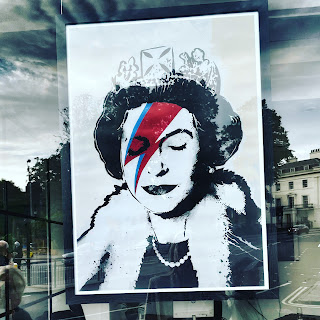A Human Queen - Conflicted Feelings About Elizabeth II
With the September 8th, 2022 death of Queen Elizabeth II, newsfeeds around the world were full of iconic images of Britain's longest-reigning monarch. Gorgeous glamour shots of the young queen, stately photos of the older woman, and even kindly grandmother pictures that wouldn't look out of place on someone's mantle. Another side of my social media feed was filled with angry posts about the monarchy's history of racist empire-building, of problematic choices by Elizabeth II personally, and the role of the crown in questionable policies. And a third subset of social media posters, especially among Americans, seem to consider the news of the queen's death unremarkable or unrelatable.
I posted this photo that I took in May during a trip to York, UK, because somehow, this representation speaks to my own conflicted feelings about her iconic status.
Unlike rock stars, media personalities, and politicians, Elizabeth Windsor didn't choose her fame, she was born to her position. I suppose she could have abdicated her reign, like her uncle Edward did, but she'd been raised under the specter of that "disgraceful" chapter in the English monarchy, and even if she'd been inclined to live a private life, she'd been conditioned from childhood to believe that her role was one of service - to the job, to the people, to the country, and to the empire.
That empire, with its long history of colonization, subjugation, and racism that still lingers today, was another thing Elizabeth was born to. From Queen Elizabeth I and the age of exploration, through the loss of the 13 American colonies, to the subjugation of the Indian subcontinent, the British Empire has stood in the center of the world. But by the 20th century, the power of the empire had begun to fade, and with Britain's reliance, in both WWI and WWII, on its colonies help defeat the Axis powers, the huge tolls of war finally led to a period of decolonization which coincided directly with Elizabeth II's ascension as queen.
On her 21st birthday, in a broadcast from Cape Town, Elizabeth pledged to devote her life, whether it be short or long, to the service of her people. Her son, now King Charles III, said "That was more than a promise: it was a profound personal commitment that defined her whole life. She made sacrifices for duty." During her coronation speech in 1953, Elizabeth II said, "I have in sincerity pledged myself to your service...Throughout all my life and with all my heart I shall strive to be worthy of your trust." Duty and service were the core principles of Elizabeth's reign, and even the Netflix series, The Crown, with it's warts-and-all portrayal of the British royals, put Elizabeth's service to her people, country, and commonwealth at the center of her character, and at the heart of many of her conflicts.
She was a constitutional monarch, not a political leader with any real powers, and she was more popular than any of her prime ministers. And yet behind the ancestral inheritance - the accident of birth that made her a queen - she was a human woman whose every misstep was on display for the world to see and judge. She made mistakes - her handling of Diana's death was a big one - and with her popularity could arguably have done so much more to create better lives for her subjects. Online criticism after her death seemed to focus on her continued role as head of the Commonwealth as an extension of colonialism and its policies, but Tom McTague, of the Atlantic based in London wrote "The irony is that in doing her duty to this imperial shadow in the same way she did her duty to Britain, she was better able to symbolize a modern, multicultural Britain and the world of the 21st Century than logic might suggest was possible for an aristocratic European princess."
My own fascination with the history of Britain's monarchy began when I was young, the first time I visited the Tower of London, saw the crown jewels and the armor of kings, heard the stories of beheadings, and brought home a stamp collection with portraits of every king and queen of England. It was the queens who fascinated me the most - the women who ruled in their own right, not as a wife or a mother. There were very few queens in that stamp collection and the three primary ones, Elizabeth I, Victoria, and Elizabeth II were responsible for the most remarkable reigns in British history. I have only ever known England to have a queen, and now it's unlikely I'll ever see another queen on its throne.
I think that's at the heart of my feelings about Queen Elizabeth - she was a woman with a big job. Her entire existence was about being in service. She was human, she made mistakes, she could have done more/better/other with the perceived power and outrageous wealth she inherited through an accident of birth. She was the product of her upbringing, the expectations of her position, her age, gender, and the pressures placed on her by 900 years of tradition, so all the would-haves and should-haves about her reign are pointless to consider. She did what she did because she was the person she was, good or bad, right or wrong, and like all of us, she did the best she could with the tools she had. And perhaps the most striking part of the poster that hung in a gallery window in York just weeks before her Platinum Jubilee, was not the iconic lightning bolt of the rock star queen, but the quiet acceptance of a woman who did a job because it was there to do.


